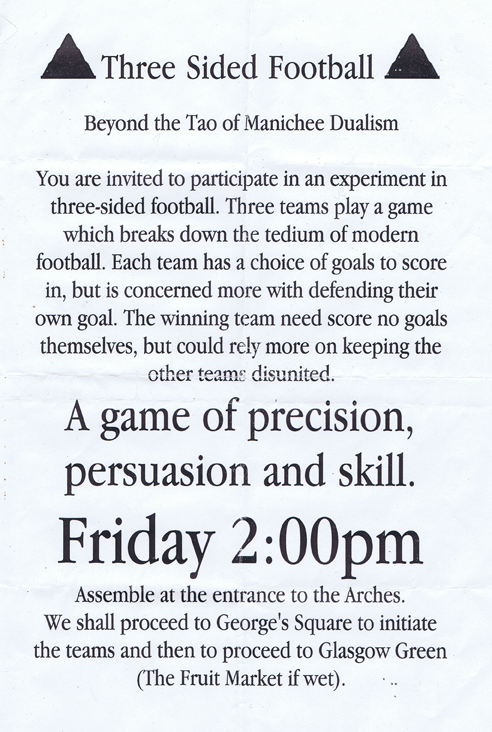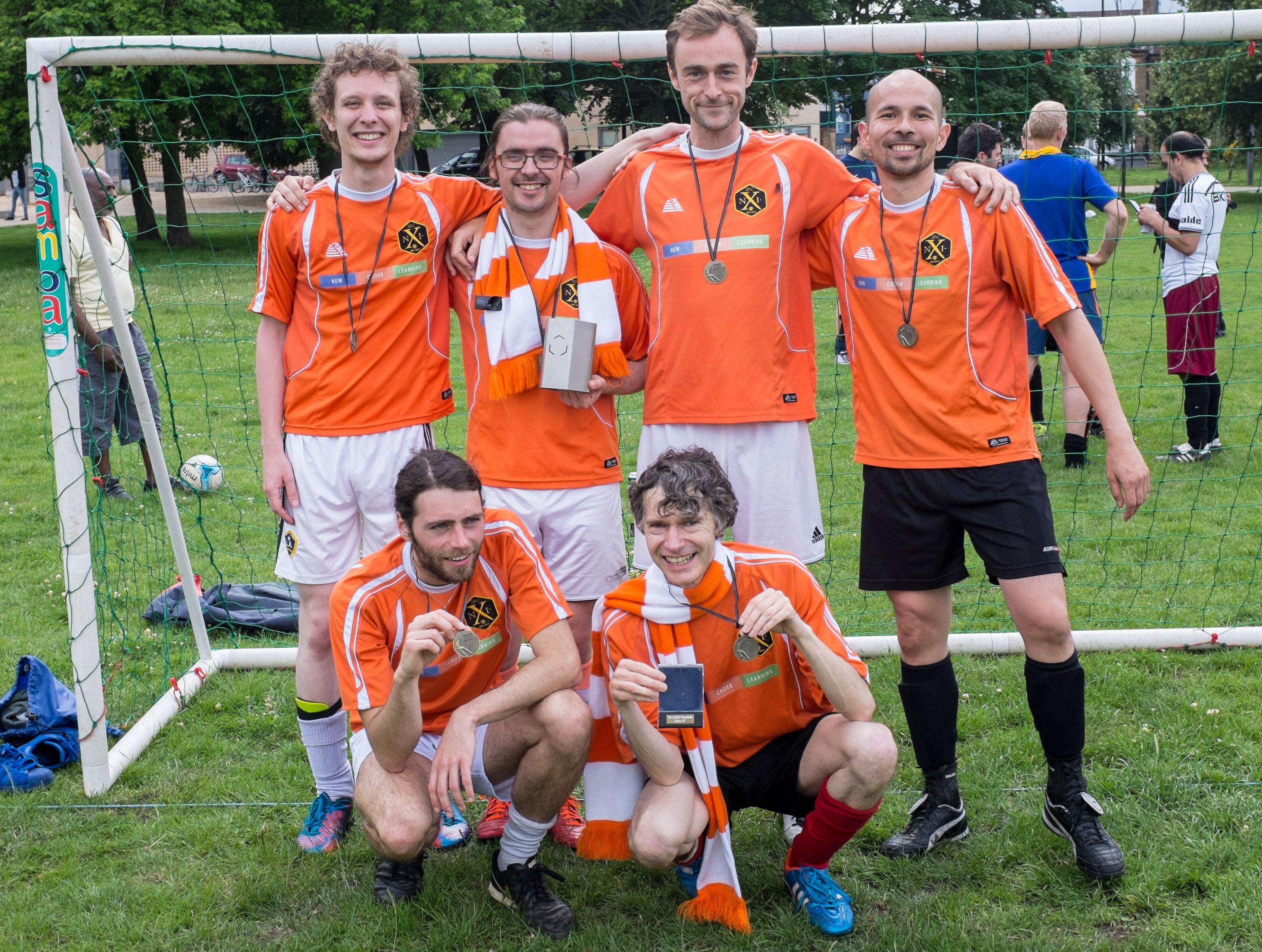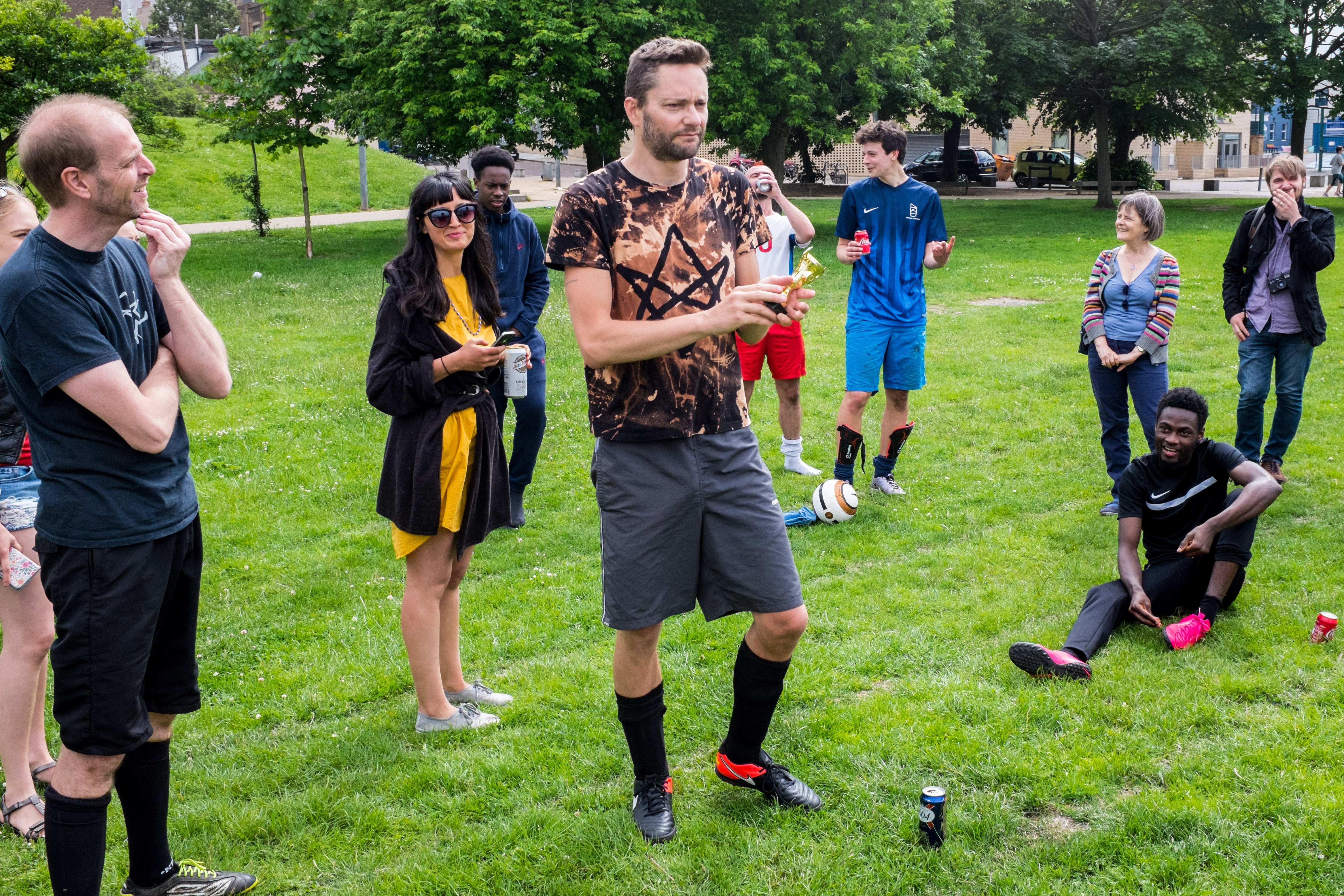It is nearing 2pm on the first Sunday in June, and I’m at Deptford’s Fordham Park in south-east London, a paintbrush’s throw from Goldsmiths, alma mater of the arty glitterati. I’m wearing studded boots for the first time in a decade, ready to make my debut in the Luther Blissett Three-Sided Football (3SF) League, on the last day of the 2016-17 season.
Greg, a Polish builder sporting a scarlet Mohican, introduces himself with a wink and a hearty handshake. A player from another team snakes across the hexagonal pitch – six, 27-metre-long sides have been marked out by fraying string – on his rusted bicycle. He dismounts flamboyantly, twirling a hoary, upturned, waxed moustache that Salvador Dalí would have envied.
A third character, modelling faded neon-pink socks, is Chris Collier, the towering captain of Strategic Optimism Football, who enjoys playing ‘psychogeographical incidental urban poker’ in his spare time. He hands me a brooding jersey with a hexagram sigil at its centre. “This auto-destructive shirt was painted, splattered and dunked with a specially mixed brew of bleach and sulphuric acid, during a particularly violent thunderstorm,” the 35-year-old teacher tells me. “Welcome to the side.”
The rise of 3SF
I’ve come to experience the subversive, cultish alternative sport of 3SF, which Mark Dyson, one of collective group of 20 trailblazers responsible for establishing the league three years ago, suggests is “football fused with chess, and poker”.
“The rules are very simple,” he continues, cheerily, while clipping the last of the netting to the three makeshift goals. “And there are only three of them.” Namely, three teams of (in this case) five players are required on the pitch at the same time; the ball used must be round; and – here’s the kicker – the victors are the ones who concede the fewest goals.
The games, which last 60 minutes (with three – of course – rotations of 20 minutes), adhere to some elements of conventional football: goal kicks; throw-ins; and corners. There is no extra-time, though, and no offsides, unsurprisingly. And no referee. “Teams agree democratically on whether an infringement has occurred,” says Dyson, who in January 1994 played in what is widely regarded as, if not quite the first, the most-significant 3SF match in history.
The wiry, 51-year-old architect recalls being one of the “lucky people” to take to a frosted Glasgow Green to try out the bizarre game. It was a direct response to late Danish artist and philosopher Asger Jorn’s conjuring of the concept as a method of explaining his refinement of the Marxist dialectic (resulting in what he referred to as “triolectics”) in his 1962 book The Natural Order (Naturens Orden).
Dyson, with a mischievous grin, proffers me a timeworn flyer advertising the match that was handed out to delegates at that Glasgow Anarchist Winterschool meeting 23 years ago. “You are invited to participate in an experiment in three-sided football,” it begins. “Each team has a choice of goals to score in, but is concerned more with defending their own goal. The winning team need score no goals themselves, but could rely more on keeping the other teams disunited.”

That famous 1994 game was proposed by The London Psychogeographical Association’s Fabian Tompsett, who stumbled across the idea after he began translating Jorn’s texts in to English in 1990. According to the flyer, it promised to break “down the tedium of modern football” and required “precision, persuasion, and skill”. The inaugural match was not easy on the eye, however. “Most of us had had a bit too much to drink and certainly a bit too much to smoke when we went out to the pitch,” Dyson, who despite the chilly conditions bravely used his jumper for one of the six goalposts, said in a 2015 interview with Vice.
“I vaguely remember the first five to 10 minutes as about 50 people just running after the ball. None of us were footballers, so it must have looked appalling. This went on for about half an hour, but it was bloody freezing so we quickly abandoned it and fled to the pub.”
Back in south-east London, Dyson tells me he didn’t play 3SF again until the early 2010s. Buoyed by interest, he and likeminded friends of an artistic, anarchy bent founded Deptford Three Sided Football Club (D3FC) in February 2012, to commemorate the 50th anniversary of Naturens Orden. Two years later the league – which currently boasts six clubs, including the wonderfully titled Aesthetico Athletico, Philosophy FC, and New Cross Irregulars – was established. And the quality of standard has steadily improved, unfortunately for him.
“When we started, the league attracted a lot of art students, and we couldn’t play football to save our lives; we could just about kick the ball in a vague direction,” Dyson tells Raconteur. “Deptford was perfectly suited to the game for a number of reasons: not only does the area allegedly have the largest concentration of artists per square kilometre in Europe; but, more importantly, unlike most of London’s parks, Fordham Park is a free communal space that is not policed.
3SF is football fused with chess, and poker
“We have always employed a policy of radical inclusivity; we don’t turn anyone away. Initially there were a lot of ladies and kids playing. Occasionally the drunks, who enjoy watching us, come and have a go, and fall over. It’s all lovely. Now it attracts football stars; because of that, I’ve had to relegate myself to goalkeeper.”
Notwithstanding his alleged lack of footballing talent, in mid August Dyson will take his goalkeeping gloves to Kassel, a city in central Germany (“the capital of the German fairy tale route”, informs the local tourist office), where the second 3SF World Cup is taking place. It will be an extension of Documenta 14, an exhibition of contemporary art.
“There are various subversive and surreal things happening, and a lot of different festivals being superimposed on top of each other, because Lithuanian Redas Diržys, the director of the Art School of Alytus, loves the quantum concept of superposition,” says Dyson.
There, in ‘Kathalytus’ – “a psychogeographical merger of the three cities of Kassel, Athens and Alytus” – he will represent “the temporary autonomous republic of Deptford, which secedes from the UK for the purpose of all international matches; there is even a ceremony for the secession”.
Three years ago Dyson featured at the first World Cup, fittingly held in Silkeborg, a Danish town located in the middle of the Jutlandic peninsula and the birthplace of Jorn. He died in 1973, yet his legacy and rebellious spirit lives on through his provocative and pioneering art and literature, and 3SF.

The New Cross Irregulars
The origin
Jorn was born in March 1914, four months before the start of World War I, to Lars Peter and Maren Jørgensen, both teachers, and committed Christians. He rebelled first against religion, inwardly to begin with, and later against authority, outwardly. Jorn became a founding member of the avant-garde movement COBRA as well as the Situationist International, a cluster of social revolutionaries, artists, intellectuals, and political theorists, prominent in Europe from 1957 until its dissolution in 1972, a year before his death.
The group, disillusioned by everyday life in an increasingly capitalist world, sought to disrupt the possibilities of work and play by throwing up creative alternatives. Triolectics, Jorn’s philosophical system, was manifested through 3SF, though the game was never played in his lifetime.
“Jorn felt that the dualistic antagonisms of the East / West political dialectic could be ameliorated through the introduction of a tertiary power which would engender a rotational series of shifting alliances to neutralise the tension,” Dyson said in a Telegraph article published on the eve of the 2014 World Cup. “To help explain, he suggested imagining a game of football but with three sides instead of two.”
Geoff Andrews, who in 2013 launched the International Three Sided Football Federation, is manager of Philosophy FC, and was another co-founder of the Luther Blissett 3SF League, tells Raconteur: “There has always been an anarchic side to 3SF, which is, literally, the thinking man’s version of football. Asger was looking at modern capitalist society which he thought was divided in a two-class battle and he wanted a way to disrupt or at least challenge the ethos of that system; 3SF allows individuals to express themselves in a more liberating, spontaneous way than in the conventional game.
“There has been a lot of media interest from across the globe as well as at a more local level – from people who just want a kick about, from coaches of semi-professional teams interested in improving training methods, and from men and women, young and old, who seem to enjoy the simple pleasures of playing football, in contrast to the corporate game. It is a modern, or even postmodern, take on ‘jumpers for goalposts’.”
Collier, the skipper of Strategic Optimism Football – a club currently in a ‘chiselling phase’, “during which we hope to eradicate ourselves completely by 2019” – says: “Games have been played from Australia to Alytus, Belarus to Bilbao, Borneo to Bogotá, Malawi to Milan, and New York to Malaysia. They have been played in ancient stone circles, cemeteries, and Soviet fuel silos. There was even a midwinter, midnight game in a remote mountain forest in the Czech Republic, and another on the shore of the Baltic Sea played with a giant football the size of a Ford Fiesta.”
Dyson tells Raconteur that the Luther Blissett 3SF League – which, incidentally, is not named after the former Watford, AC Milan and Bournemouth striker, who won 14 caps for England in the early 1980s; rather, it was adopted because the London Psychogeographical Association had proposed the founding of such a league in back in 1996, and suggested the name in solidarity with the Italian ‘Luther Blissetts’, who were cultural activists who staged urban and media pranks – is “just another one of the many experiments” of the sport.
There has always been an anarchic side to 3SF, which is, literally, the thinking man’s version of football
“When we played one-off games many times we came to understand that in conventional play there is a societal levelling off,” he says. “The nature of the triolectic at work means that there is a built-in advantage to the minority teams, so they would gang up on the winning team towards the end of the game. And that occurred on a regular basis.
“We hoped that by setting up the league, the mathematical dynamics of overall league positions would break that, habit and result in more nuanced games. We were attempting to see whether there were some other methods of organisation which would disrupt that particular dynamic.
“The league – which convenes on the first Sunday of every month, from September to June – has worked, in that there are some utterly bizarre scores. In one of the most intriguing matches, at the end of the 2015-16 season, the players from my team, Deptford, were trying to score in their own goal, while New Cross Irregulars had fled their goal to try and defend any goals from going in against us, because of the triolectical permutation of goalscoring.
“It was wonderful that happened, but at the same time, strangely, within the league there was a reintroduction to the dialectical competitiveness that conventional football exhibits, which was what was being deliberately critiqued by 3SF. So the league has half the spirit of three-sided football, and half the spirit of conventional football.”

Chris Collier and Mark Dyson at the game
The game
As I take to the hexagonal pitch in my fragrant but rather menacing-looking Strategic Optimism Football shirt, Gazzetta dello Sport journalist Filippo Ricci’s description of 3SF being “organised chaos” comes to mind. Captain Collier, a Goldsmiths graduate, ushers me out to the right ‘wing’, and within a couple of minutes I’ve rounded Dyson to score against D3FC, having been played through beautifully by an Aesthetico Athletico player.
We net a few more times, in both opponents’ goals, to make the score 2-2-0 after 20 minutes, when the whistle for the first rotation is blown. During the break, tactics are discussed, and collectively we are urged to dismiss any natural and conventional impulses to attack. It’s hard, and weird, to resist.
As we enter the final third of the match, Strategic Optimism Football are still winning – or not losing – 5-4-3, after Aesthetico Athletico’s goalkeeper rolls the ball to our striker, Matt, who then scores against him immediately, and cheekily. I start to think this 3SF malarkey is a breeze. In a blink that thought, and the mood of the game, changes.
Suddenly, both of our opposition teams are ganging up against us; it’s 10 versus five – and one of our five is Mo, who is playing in slip-on shoes and seems to be checking various social media accounts on his smartphone. We attempt to hold on to our lead, akin to Davy Crockett in the Battle of the Alamo, and like the raccoon-hat wearing commander in the Texas Revolution, it is only a matter of time before our defences are breached, twice, alas. Amazingly, the hugely enjoyable game ends in 5-5-4, with my adopted team having leaked a handful of goals.
“That was one of the best games ever,” says Dyson, taking his mudded gloves off. “Everyone deserves a beer. And with it being the last day of the season who is up for trying another game of football – but without a ball? It’s a card game called Wandsworth …”
I ask Collier about whether he is planning to attend the World Cup, which runs from August 18 for three days. “I will indeed,” he beams, “but the team will not represent any topographical region or nation state. For we hail from the psychogeographical territory of ‘Meonia’.
“There will be five of us travelling over from Meonia in our new ‘I Scream’ van, which is like an ice cream van, but instead of playing the maudlin strains of Greensleeves or Yankie Doodle, passersby will be subjected to a marginally less annoying barrage of auto-destructive noise and shrieking.
“If you fancy it, you are most welcome. Why don’t you bring your boots?”
Maybe I will, I tell him. And I mean it.
After weeks of chasing I finally hear back from Tompsett, who – if Jorn is the father – is considered to be the son of 3SF. Via email I had asked him what the great Dane would think about the flourishing of his game, now that we are approaching the second World Cup.
“He would be waiting patiently for the third,” he replies, adroitly.
The rise of 3SF




